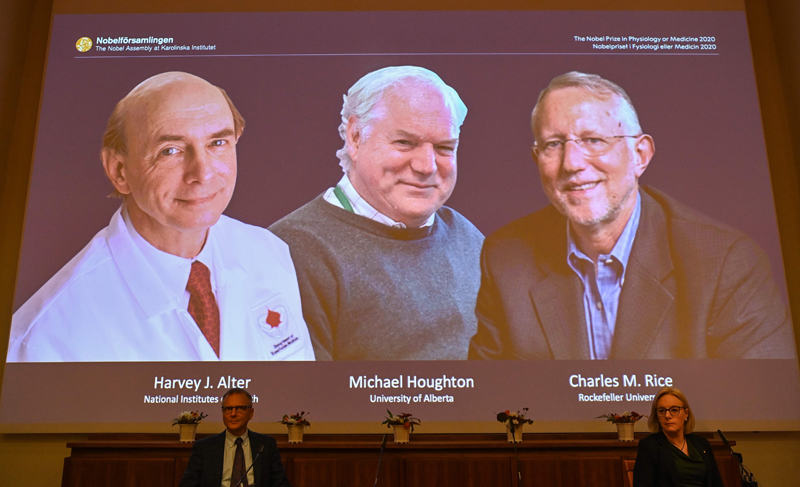
STOCKHOLM: Americans Harvey Alter and Charles Rice together with Briton Michael Houghton won the Nobel Medicine Prize yesterday for the discovery of the Hepatitis C virus, paving the way for a cure, the Nobel jury said. The three were honored for their "decisive contribution to the fight against blood-borne hepatitis, a major global health problem that causes cirrhosis and liver cancer in people around the world," the jury said.
The World Health Organization estimates there are around 70 million Hepatitis C infections globally, causing around 400,000 deaths each year. It is characterized by poor appetite, vomiting, fatigue and jaundice. Thanks to the trio's discoveries, highly sensitive blood tests for the virus are now available and these have "essentially eliminated post-transfusion hepatitis in many parts of the world, greatly improving global health", the Nobel committee said.
Their discoveries allowed the rapid development of antiviral drugs directed at Hepatitis C. "For the first time in history, the disease can now be cured, raising hopes of eradicating Hepatitis C virus from the world population," the jury said. Alter, 85, told Swedish Radio he was stunned to receive an early-morning call from the committee, saying it was "mind- boggling". "I didn't even realize this was the day the Nobel Prizes were going to be given out," he added. "To see so many people get cured is astounding," he told the Nobel Foundation.
Prior to the trio's work, the discovery of the Hepatitis A and B viruses had been critical steps forward -the discovery of Hepatitis B won the Nobel Medicine Prize in 1976 - but the majority of blood-borne hepatitis cases remained unexplained. The discovery of Hepatitis C virus revealed the cause of the remaining cases of chronic hepatitis, and "made possible blood tests and new medicines that have saved millions of lives", the Nobel committee said.
Alter was credited for his pioneering work studying the occurrence of hepatitis in patients who had received blood transfusions, determining that their illness was neither Hepatitis A or B. Houghton built on Alter's work to isolate the genetic sequence of the new virus. Rice, 68, subsequently completed the puzzle by using genetic engineering to prove that it was the new strain alone - Hepatitis C - that was causing patients to get sick. The trio will share the prize sum of 10 million Swedish kronor (about $1.1 million).
In 2013, Houghton reportedly declined Canada's Gairdner International Award because two of his key collaborators who worked with him at pharmaceutical group Chiron Corp were not included. Houghton, Alter and Rice would normally receive their prize from King Carl XVI Gustaf at a formal ceremony in Stockholm on Dec 10, the anniversary of the 1896 death of scientist Alfred Nobel who created the prizes in his will. But the in-person ceremony has been cancelled this year due to the pandemic and replaced with a televised ceremony showing the laureates receiving their awards in their home countries.
The award for work on a virus comes as the world battles the new coronavirus pandemic, which has put the global spotlight on science and research. "The pandemic is a big crisis for mankind, but it illustrates how important science is," Nobel Foundation head Lars Heikensten said. No prizes were expected to be awarded this year directly linked to the coronavirus, as Nobel prize-winning research usually takes many years to be verified.
But Nobel medicine committee chair Patrik Ernfors said yesterday's prize was "relatively easy to relate to today's situation". "The first thing you need to do is to identify the causing virus, and once that has been done, that is in itself the starting point for the development of drugs to treat the disease and also to develop vaccines against the disorder. So the actual viral discovery itself is a critical moment."
The 2020 Nobel season continues today with the physics prize, with astrophysicists Shep Doeleman of the US and Germany's Heino Falcke seen as possible winners for work that led to the first directly observed image of a black hole in April 2019. American mathematician Peter Shor who paved the way for today's research on quantum computers, or France's Alain Aspect for his work on quantum entanglement, have also been mentioned.
The chemistry and literature prizes follow tomorrow and Thursday. Speculation ahead of Friday's peace prize has meanwhile focused on press freedom groups, Swedish teenager Greta Thunberg and other climate activists, or several UN organizations. The economics prize wraps things up on Monday, Oct 12. - AFP
.jpg)
